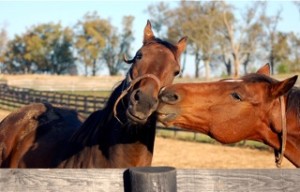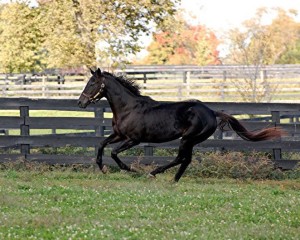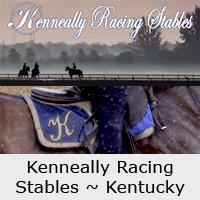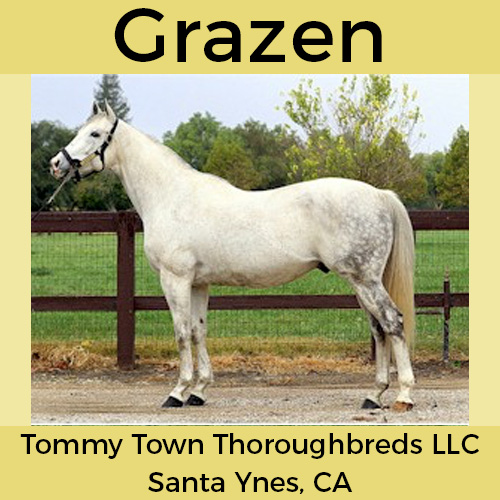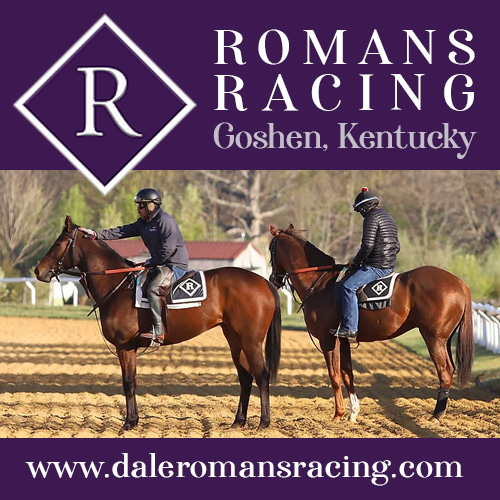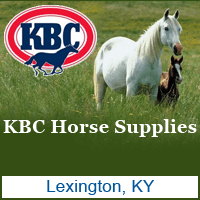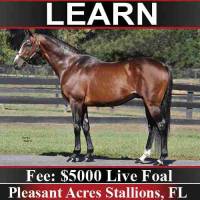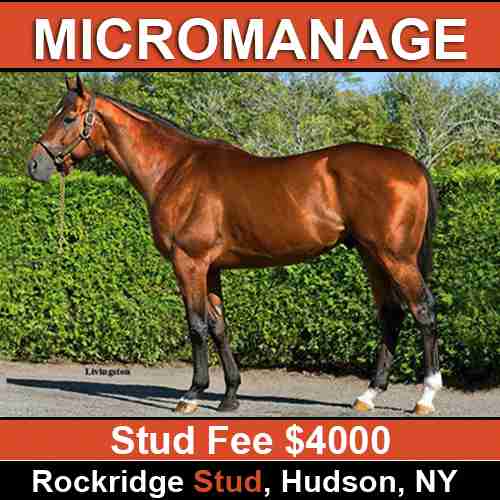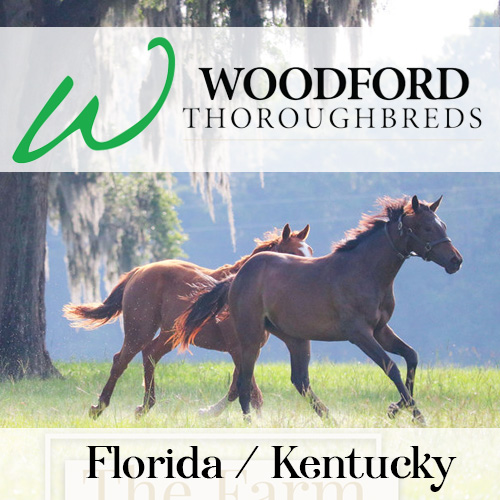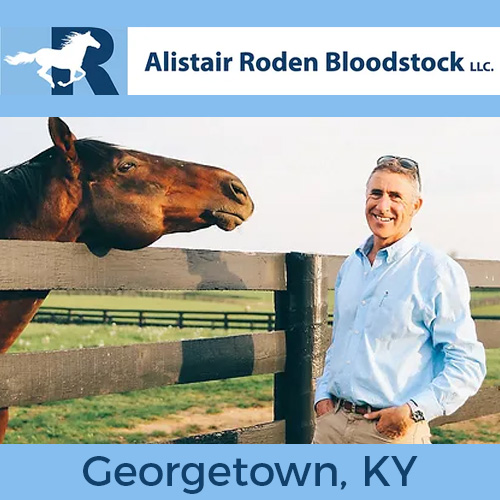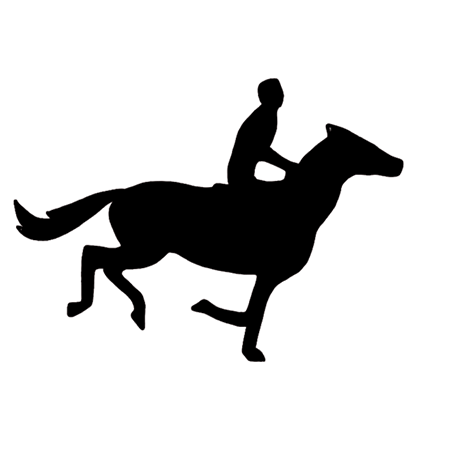The Interviews: Michael Blowen, Proprietor of Old Friends
Originally founded in 2003 by former Boston Globe film critic Michael Blowen, Old Friends today cares for more than 100 horses across three states whose racing and breeding careers came to an end. A “living history museum of horse racing”, the farm attracts nearly 20,000 tourists annually. Thoroughbred People talked to Michael about the operation
TBP: How did you get involved with horses and how did Old Friends begin?
MB: An editor at the Boston Globe where I used to work invited me to Suffolk Downs one day. I went a few more times and just fell in love with the sport.
I thought if I learned more about horses themselves I could become a better handicapper and so I apprenticed myself out for a couple of years to a claiming trainer at Suffolk Downs. He was known as the King of the Fairs. He would get old horses with some back class ready for a couple or races, but then they would disappear off the scene. It was the disappearing part that I wondered about, they used to tell me that they had found homes for these horses at riding academies in Maine.
The truth of the matter was that they were just going to the meat buyer. A lot of owners are kept in the dark by trainers about what really happens to their horses when they finish racing.
I did some stories on some of these horses, one of them was a horse called Saratoga Character who ended up in a wonderful program that the Thoroughbred Retirement Foundation ran. I got connected to them, one thing led to another and when I retired from the Boston Globe the TRF asked me to become their Operations Director.
It was a wonderful experience with 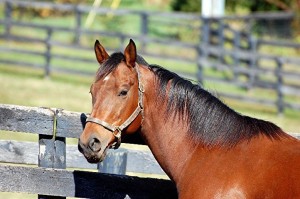 wonderful people. I discovered however that nobody in the horse retirement business was interested in taking pensioned stallions because they were considered too much trouble, too temperamental and too tough to handle. I thought maybe if we started rehoming some stallions we might be able to get a public following and people might pay to visit them and help support the operation.
wonderful people. I discovered however that nobody in the horse retirement business was interested in taking pensioned stallions because they were considered too much trouble, too temperamental and too tough to handle. I thought maybe if we started rehoming some stallions we might be able to get a public following and people might pay to visit them and help support the operation.
TBP: How did you go about getting land and a facility?
MB: We started out leasing some land and then leased a little more, then we picked up the 52 acres in Georgetown which we now own. We always need more land as we usually have a waiting list. I just signed a lease on a property next door to us which is 47 acres, and there is another opportunity to get another 100 acres, which would be great.
TBP: Do you sometimes get horses that you retrain to go on to become riding horses or to compete in other spheres?
MB: If we have a horse sent here that can be retrained we will send them over to New Vocations in Lexington who do a great job in that area. Likewise, if they get a horse over there that is proving to be a problem and can’t be retrained they will come here.
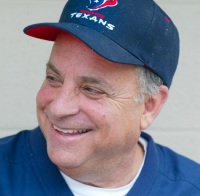 TBP: Tell us about the New York operation of Old Friends, and how it came to be named after Bobby Frankel.
TBP: Tell us about the New York operation of Old Friends, and how it came to be named after Bobby Frankel.
MB: Cabin Creek in New York is very successful, it’s run by Joanne Pepper and her husband Mark with a lot of wonderful volunteers.
I didn’t personally know Bobby Frankel, but the first great stallion we got here was a horse called Ruhlman, who Charlie Whittingham trained after Bobby had him. Ruhlman came to us with a real reputation, Peggy Whittingham told me that he was the only horse Charlie was ever afraid of. When he got here he was very tough, but after a few months he mellowed. He would roll over on his back and let you scratch his stomach and all kinds of things.
Bobby won the Woodward Stakes with Ruhlman and I ran into him at Saratoga just after Ruhlman had come to us. I said “Mr. Frankel, my name’s Michael Blowen. I have your great horse Ruhlman at my farm.” He said “That’s nice” and just walked away.
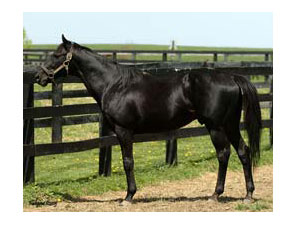 About two days later he taps me on the shoulder and says “Aren’t you the guy with Ruhlman? I loved that horse, he was the toughest horse ever. I was really sorry I had to send him to California but I am glad he was successful out there.”
About two days later he taps me on the shoulder and says “Aren’t you the guy with Ruhlman? I loved that horse, he was the toughest horse ever. I was really sorry I had to send him to California but I am glad he was successful out there.”
That was the longest conversation I ever had with him. Then when Bobby died, Dottie Ingordo, who worked for him, called me and said that Bobby had left Old Friends a lot of money and most of his trophies.
He donated well into six figures to us. He was a New York guy and that’s how Old Friends at Cabin Creek, The Bobby Frankel Division came to be named in his memory.
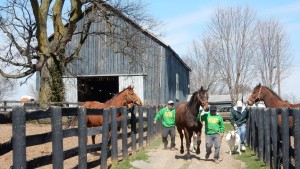 TBP: How many horses and staff do you currently have?
TBP: How many horses and staff do you currently have?
At the farm here in Georgetown we have 104 horses and over in New York there are 13. We have five paid employees. The rest are all volunteers. Our Georgetown farm manager Tim Wilson does a phenomenal job.
TBP: Was it a long process to become registered as a 501c charity?
MB: Yes, it was really a big hassle, I think it might be worse than getting audited by the IRS! We jumped through a lot of hoops to get it done and it took about two years.
TBP: How has the funding flow been since you started?
MB: Well there have been some very tough times when we have come close to becoming financially obliterated, but people came through with money for us at the right time fortunately. We are on a reasonable financial footing now, but it’s a constant challenge.
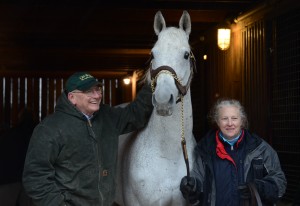 TBP: Tell us about some of the best known horses you have had at Old Friends.
TBP: Tell us about some of the best known horses you have had at Old Friends.
MB: When Silver Charm came here after his breeding career in Japan, thanks to Beverley and Jeff Lewis and the JBBA who have been tremendously helpful to us, it was one of the greatest days of my life. I’ve been in love with Silver Charm ever since 1997 when he won the Derby and the Preakness and just got beat in the Belmont to miss the Triple Crown. Now he is in my back yard it totally freaks me out! We have had other horses here who won big races, like Black Tie Affair who won the Breeders Cup Classic, Precisionist who won multiple Grade 1s and went to the Hall of Fame, Sunshine Forever, Marquetry, Tinners Way, Williamstown, Commentator. Interestingly, even though they came in all different shapes and sizes and from different training regimens, they all had one thing in common. They were all smarter than most other horses.
TBP: How do you generally raise funds?
MB: Well one of the best things to happen to horse racing in the past few years has been the creation of the Thoroughbred Aftercare Alliance. They put together a fundraising program with many great ideas. They raise a lot of money and they accredit aftercare facilities and organizations very thoroughly and very well.
We also sell "shares" in our horses. You can buy a share in Derby winner Silver Charm for a hundred bucks! That works really well. We have also been successful in getting grants from various foundations and organizations and there are a lot of wonderful individuals who help out. Bob Baffert donated $50,000 and came down to the farm to see Silver Charm the Tuesday before the Derby. His jockey Gary Stevens came to see him too.
TBP: Old Friends does a fantastic job but there is obviously a limitation on the number of horses you can take. What can be done about the broader problem of the many horses who can’t be accommodated by organizations like Old Friends because they simply don’t have enough room or funds?
MB: This is a huge problem but there are some interesting things currently going on that might help. There is a group that is getting together that is being organized by the Gaming Commission. They are seriously considering making horse aftercare taxes a condition of getting a pari-mutuel gaming license in New York. I have had some preliminary discussions with them and I am hopeful. Jack Knowlton, who owned the 2003 Kentucky Derby winner Funny Cide, has been very involved in aftercare programs and has helped get this meeting put together.
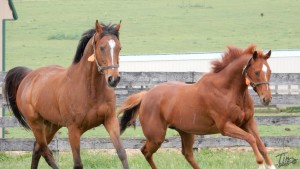 One of the best ideas I have ever heard came from the jockey Richard Migliore. He said look, you can’t create rehoming facilities for the thousands of horse who need it in the Bluegrass, because the land is too expensive. So instead, you go out to places like Montana and Wyoming where land is cheap and buy thousands of acres. You put up housing and you offer that housing to retired jockeys, trainers, veterinarians and grooms so that they can live out their retirement and volunteer to take care of the horses. It could be a tourist attraction too.
One of the best ideas I have ever heard came from the jockey Richard Migliore. He said look, you can’t create rehoming facilities for the thousands of horse who need it in the Bluegrass, because the land is too expensive. So instead, you go out to places like Montana and Wyoming where land is cheap and buy thousands of acres. You put up housing and you offer that housing to retired jockeys, trainers, veterinarians and grooms so that they can live out their retirement and volunteer to take care of the horses. It could be a tourist attraction too.
TBP: Do you have many visits from kids and schools?
MB: Yes we do, the kids love coming here. In particular, some troublesome kids who get kicked out of school come to visit and it does them a world of good. Horses can do so much for people, they don’t just need someone on their back to be useful. I think we are just scratching the surface of what they can do.
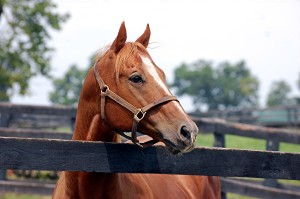 TBP: What is the process when a new horse arrives at Old Friends?
TBP: What is the process when a new horse arrives at Old Friends?
MB: When a horse arrives here we segregate them and quarantine them for three weeks so they can get acclimated and get the lay of the land. That usually means they spend half the day in a stall and half the day in a round pen. Then Tim Wilson our farm manager does some evaluating and figures out who might make friends with who. It’s quite amazing, Tim has a real knack about matching horses up. Cat Launch and Rail Trip are best friends. Game on Dude is inseparable from a horse named Yankee Fourtune. After a few more months we re-evaluate and review how they are getting along.
TBP: When a horse’s time does come along, what happens?
MB: They are usually euthanized humanely out in their paddock. I actually never believed it and I thought this was apocryphal, but they really do tell you when they’re ready to go.
I don’t think we have ever euthanized a horse too early, but I think we have euthanized a couple too late. You think you are doing the best trying to keep them alive but sometimes it’s a mistake. We’ve had a couple of older horses undergo colic surgery and if it doesn’t work the last few hours of their life can be very rough.
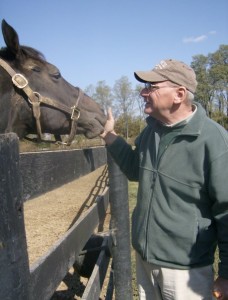 We had a wonderful old horse here called Ogygian. Before he died, he just sat down in his paddock one day. I called the vet and all Ogygian's friends and the volunteers who looked after him. We all gathered around him in his paddock and you could tell that it meant a lot to him. He was very relaxed. He knew exactly what was going on and he was ok with it. It was very peaceful. It did his caretakers a lot of good too.
We had a wonderful old horse here called Ogygian. Before he died, he just sat down in his paddock one day. I called the vet and all Ogygian's friends and the volunteers who looked after him. We all gathered around him in his paddock and you could tell that it meant a lot to him. He was very relaxed. He knew exactly what was going on and he was ok with it. It was very peaceful. It did his caretakers a lot of good too.
TBP: Do you still get to the races and handicap?
MB: I do, but I am now an even worse handicapper than I ever was, because I can’t be objective. I look for horses who are related to those we have here and I am obviously biased towards them regardless of their chances!
